Contents
Summary
Dry cracked skin is especially common in dry climates, especially where fine dust is present. Microscopic cracks can result in mysterious sharp stabbing pains, usually near the edges of the sole. Also extremes in cold (which can also be extremely dry), alternated with being inside warm dry heated homes can also lead to cracking skin (not only of the feet). My lips were frequently dry and cracked in the winters of northwestern lower Michigan where I lived the first 24 years of my life.
Oil after Bathing
The quickest most effective solution I have read about and occasionally used myself, is to oil the feet after soaking. Charlie used Vaseline but you can use your own favorite oil, like olive oil or coconut oil.
After soaking the feet, or after showering or bathing long enough for the skin to get hydrated, rub natural oil of your choice into the skin. Wear socks (preferably natural fabric) to protect your floors and bedding from getting greasy.
The only trouble I have ever had with my feet was last winter when my heels cracked on the edges where they become vertical. At first I attributed it to lack of wearing off of the excess skin, so I scraped my sides of my feet and heel on the rough pavement after each workout. This didn’t do it. Then I put Vaseline on the same areas. Still no result. I now have it solved. After a shower when my feet are sodden and soaked, I apply the Vaseline and rub it in. Evidently , the thick skin would just dry so much that it would crack. The thinner (fresh) skin on the bottom of the foot is more supple and doesn’t do this. I have found great use for Vaseline (petrolatum is the non-trade name) on wet skin, especially if sodden and soaked. It seem to go on in an emulsion rather in a greasy manner as when applied to dry skin. Anyway, I have cured the sides of my heels and also the spots under the arch that don’t touch the road. – Dr. Charlie Robbins, M.D., Charley Robbins’ Scrapbooks: Running with the Best Since 1936
Diet
Diet also plays a major role in skin health. Consider eating a more holistic, natural foods, and avoid as much as practical processed, refined, synthetic, and salty foods, and stay well hydrated by drinking water. Even before I became Vegan, I never had much problems with dry cracked skin, except in extreme climates. I attribute this, partly to genetics, and partly to a long history of eating natural, whole, minimally processed foods. Skin grows from the inside, and that’s where we should be putting nutrients in the long run.
I have found taking unprocessed coconut oil is helping me. You could combine it with a tspn of good quality (Carlson’s) cod liver oil. No
more cracks in my feet or hands.–Richard
Cracking skin is a sign of internal fatty acid problems.I’ve also only rarely used any kinds of lotions or oils or magic potions on my feet. These are to preserve dead skin, and perhaps suffocate and sometimes even poison the living, growing skin cells beneath the surface. Which, while making the dead skin cells look more “healthy” and “alive”, in the long run, may actually hinder true healing. However, I’m not opposed to an occassional soak, either walking with my feet in the ocean’s water (now that I live in southern California), or a tub of epsom salts, baking soda, and table salt. These are both fine and natural antifungual agents, and in addition to the walk in the sea water, a walk on the beach sand provides a good and gentle scrubbing.
- Eat more natural healthy oils- fish, nuts, olive oil
- Take some vitamin E
- Use Vaseline on your cracked feet
- Use all the lotion you feel you need
If you are going to keep wearing shoes on a regular basis, get an antifungal cream like Kerasal because the fungus that can cause cracking thrives in the shoe environment (moist, dark, warm).
Good luck and happy running!
Kristyan
Climate
In the winters of northwestern lower Michigan, and when I spend more than a few days in the desert my lips and sinuses would often dry out and suffer cracking, sometimes to the point of bleeding.
Shoes
Avoid wearing shoes as much as possible. The dark, moist, warm environment inside shoes promotes the growth of fungus (athlete’s foot) which can suck moisture and nutrients out of the skin (Fungu is great for helping dead trees decompose – likewise with your skin). And synthetic socks can also be a skin irritant with some people, and you won’t know if you’re one of them, until you eliminate possible causes for long enough to recover.
Lotions, Potions, and Powders
There are no magic lotions, potions or powders. Considering that fine dust seems to be a contributing factor, powders might make things even worse.
Sandpaper
Do NOT sand your skin. Trying to sand off the dry or callused skin may only make things worse. Remember calluses are a protective response to abrasion.
Genetics
I have naturally oily skin, so this hasn’t been much of a problem until I started getting older. But, not much you can do about genetics.
Videos
Gallery
- Dry skin on big toe
- Cracks in heel
- Use your favorite oil, we recommend extra virgin olive oil, or coconut oil
- Rub oil into skin after soaking or bathing to hydrate
- Put socks over oiled feet to protect your home
- Wear socks over oiled feet to bed
- Rub oil into skin after soaking or bathing to hydrate
- Charley Robbins, Running with the Bes tSince 1936, backcover
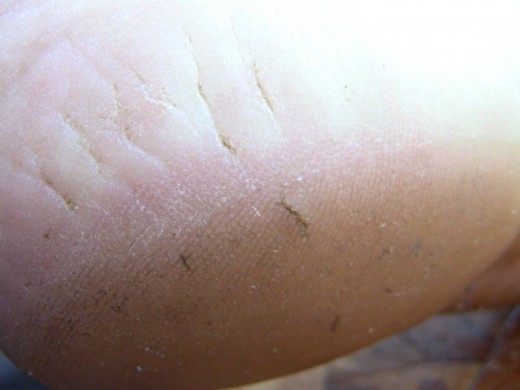
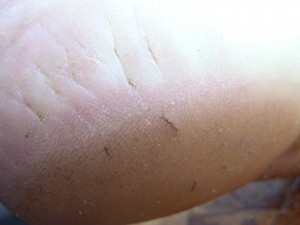
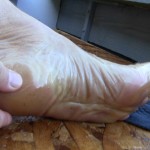
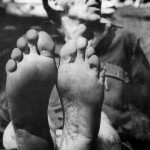

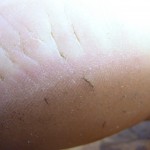
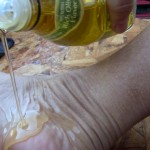
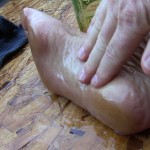
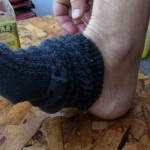
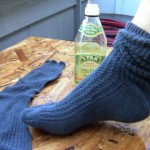
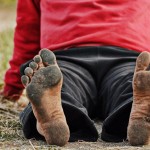
I have tried A LOT of different natural substances on my feet to keep the dryness away. The best I have found is unpasteurized unhomogenized organic 100% grass fed butter. Rub it on… it is truly the best. Of course organic raw grass fed butter might be hard to find, but it is worth it.
Vaseline is petroleum based, stay AWAY from all petroleum based products. THINK people! If you would not eat it do not put it on your skin.